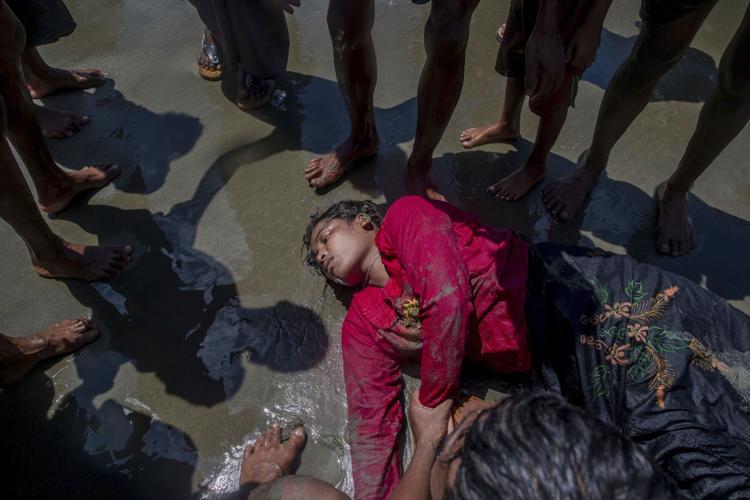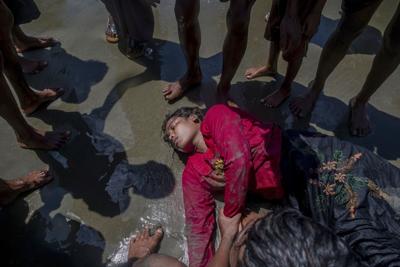It is the 20th anniversary of a distinctly Canadian gift to the world, but there’s little cause for celebration.
In September 2005, leaders gathered at the United Nations headquarters and adopted a groundbreaking doctrine ŌĆö one inspired by the horrible darkness of the Bosnian and Rwandan genocides, one powerfully .
ŌĆ£We must not give free rein to warmongers; we must not abandon civilian populations, the victims of brutal repression, to their fate; we must not allow the rule of law and international morality to be trampled underfoot.ŌĆØ
The words were spoken in 2011, when the UN Security Council gave , where an uprising against Muammar GaddafiŌĆÖs regime had resulted in a brutal crackdown on the dissenting population.
There was, in other words, a responsibility to protect, one that had been shirked by the Libyan government, and now the rest of the world had an obligation to step in.
Two decades after the adoption of the R2P policy (the United Nations is ever so fond of acronyms), it remains an ŌĆ£unfulfilled promise,ŌĆØ in the words of Secretary General Antonio Guetteres.

This frame grab from 2017 video shows a Syrian doctor treating a boy following a suspected chemical attack, in the town of Khan Sheikhoun, northern Idlib province, Syria.
Uncredited APA policy meant to bolster that post-Holocaust refrain that the world would ŌĆ£ŌĆØ stand idle in the face of civilian atrocities is now mocked by vertiginous death tolls and daily horrors in the Gaza Strip, Sudan, Democratic Republic of the Congo, Myanmar or Afghanistan among other places.
In a June debate to mark the anniversary of the Responsibility to Protect, UN member states were reminded that there had been 37 million forcibly displaced people around the world in 2005.
That number that has now more than tripled to 122 million, according .
Blame can be widely ascribed, but Lloyd Axworthy, the former Canadian foreign minister who helped shepherd R2P into existence, says it falls most heavily on the current crop of national leaders.
Too often, he said in an interview, R2P is interpreted by nations today as a responsibility to protect their controversial allies and their own narrow interests: ŌĆ£We donŌĆÖt seem to have international leadership anymore.ŌĆØ
That wasnŌĆÖt always the case. In 1999, the NATO military alliance launched a 78-day bombing campaign aimed at pushing the Yugoslav army out of Kosovo. It was controversial, but allowed the deployment of UN peacekeepers to protect Kosovo Albanian civilians from execution, sexual violence, forced displacement and persecution.
It ended and provided the spark to accomplish something bolder.
Confident and content with CanadaŌĆÖs new-found global influence following the signing of the 1997 Ottawa Treaty to ban landmines, then-prime minister Jean Chr├®tien agreed to have Canada sponsor an international commission to study the issue of intervention and state sovereignty.
The result was which concluded that states must be able to protect their own citizens and, if not, that the job should be taken up by the international community.

Scattered debris and still-burning fires amidst plane wreckage are seen at a military airplane factory in Pancevo, Yugoslavia, on March 24, 1999 after NATO┬Ā missiles hit the building.┬Ā
IVAN DOBRICIC APŌĆ£The very term ŌĆśinternational communityŌĆÖ will become a travesty unless the community of states can act decisively when large groups of human beings are being massacred or subjected to ethnic cleansing,ŌĆØ the report’s authors .
UN member states agreed and adopted R2P at the 2005 World Summit. It has been invoked nearly a hundred times in debate on resolutions at the powerful Security Council.
But too often, the words have proven weightless, failing to summon states to action, to intervention.
R2P has been used to justify the dispatch of outside military forces to Libya, C├┤te dŌĆÖIvoire, Mali, Congo, Sudan, South Sudan and the Central African Republic. But attempts to prevent, relieve or end humanitarian catastrophes in conflict zones have nearly as often hit political walls ŌĆö walls erected by the worldŌĆÖs most powerful countries.
They include: Russia using its Security Council veto to protect its ally Syria, or to protect itself over the invasion of Ukraine; China vetoing actions to rein in North KoreaŌĆÖs nuclear program; and the United States using its veto to protect Israel over its prosecution of the war in Gaza.
Several movements are afoot to reform the council, including a proposal by France and Mexico to strip the five permanent members of their veto on resolutions dealing with cases of mass atrocity.
They seem doomed to failure, though, mainly because Russia, China and the U.S. would likely stand in the way. Other troubling trends have also emerged, said Savita Pawnday, executive director of the New York-based Global Center for the Responsibility to Protect.
It used to be,┬Āshe said in an interview, that providing solid evidence about the rising risks of civilian harms in faraway war zones was sufficient to prompt serious reflection and, it was hoped, action.
ŌĆ£What has become clear is that (countries) stand by allies at whatever cost. And the other thing ŌĆö and it started with Syria ŌĆö is that (they) present alternative facts.ŌĆØ
The Syrian government denying, despite strong evidence, that it had used chemical weapons against its own people in rebel territory; Russia claiming it is fighting to rid Ukraine of Nazis; Israel insisting that a Gaza hospital, or a journalist, or a refugee camp is used by or affiliated with Hamas terrorists, and therefore a legitimate target.
The political lies and spin are taking a toll and Pawnday said a sense of defeatism has set in where once there was hope that civilian casualties of conflict would be sheltered or saved.
In Myanmar, where the military government began a campaign of persecution against the Rohingya minority that has led to more than a million seeking shelter across the border in Bangladesh, there has been .┬ĀIt expressed concern about the fate of the Rohingya and demanded an end to the violence, but ultimately concluded that the Security Council would do nothing more than ŌĆ£remain seized of the matter.ŌĆØ
Anything firmer in its condemnation would have been vetoed by China and Russia, which both abstained on even the watered-down wording of that resolution.
ŌĆ£I was at a retreat with UN Security Council members where they were asking me about Gaza, and they were saying, ŌĆśWell, itŌĆÖs kind of frustrating because we keep on presenting these resolutions, which will be vetoed,ŌĆÖ ŌĆØ Pawnday recalled. ŌĆ£And I was like, ŌĆśKeep presenting them because, at this point, even performance is important.ŌĆØ
Pawnday said the adoption of R2P in 2005 has, however, led to a massive cultural shift as well as more thorough observation, investigation and documentation when atrocities are committed through bodies like the UN Human Rights Council.
Only the most recent example is a UN commission which that IsraelŌĆÖs war in Gaza constituted a genocide against Palestinians, a charge that the Israeli government rejected.
ŌĆ£There are things that are happening ŌĆ” We have better accountability, collection of evidence, establishing the facts of the situation, acknowledging that these crimes are occurring,ŌĆØ Pawnday said.
ŌĆ£What we are really failing at is response.ŌĆØ

Minority Rohingya Muslims are holed up in a “no-man’s land” between Bangladesh and Myanmar in 2018.┬Ā
JOE FREEMAN AFP/Getty ImagesSome might chalk it up to the nostalgia ŌĆö or naivete ŌĆö of an idealist, but Axworthy sees both a desperate need and a huge opportunity to resuscitate the R2P policy for the modern age when world leaders flock to the UN General Debate in New York City next week.┬Ā
Prime Minister Mark Carney, along with French President Emmanuel Macron and British Prime Minister Keir Starmer are expected to formally recognize the state of Palestine in their speeches next week.┬Ā
Axworthy would like to see something less symbolic, more concrete: Canada marshalling like-minded middle powers to commit to shaping a world in which there are greater civilian protections, humanitarian aid that gets to where it is needed and safe migration routes, so that those displaced by war and crisis are not dying in their bids for safety.

































